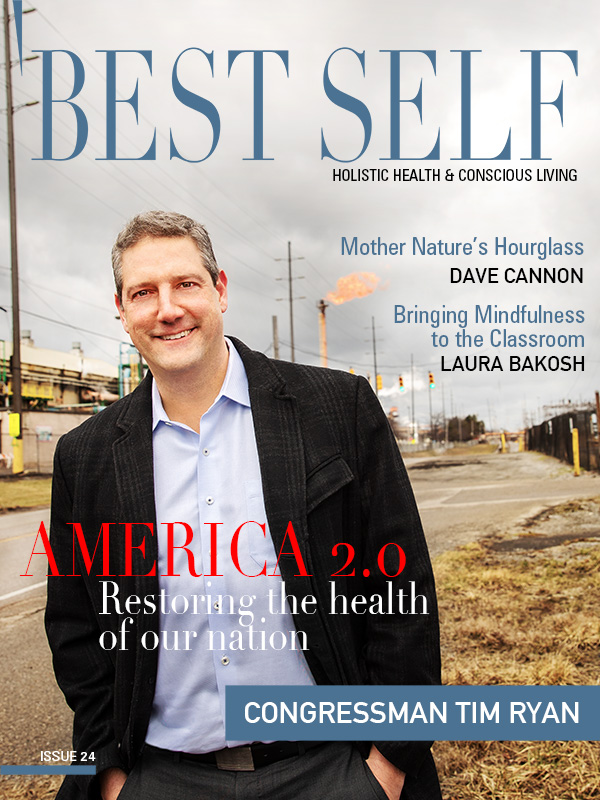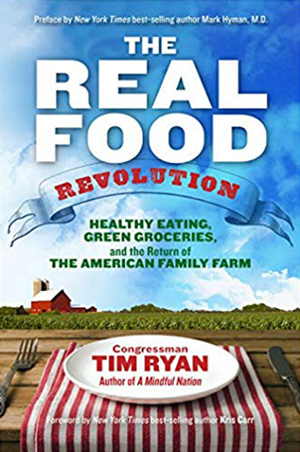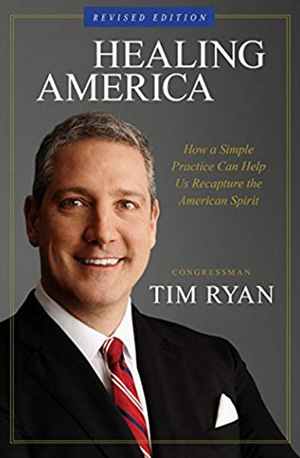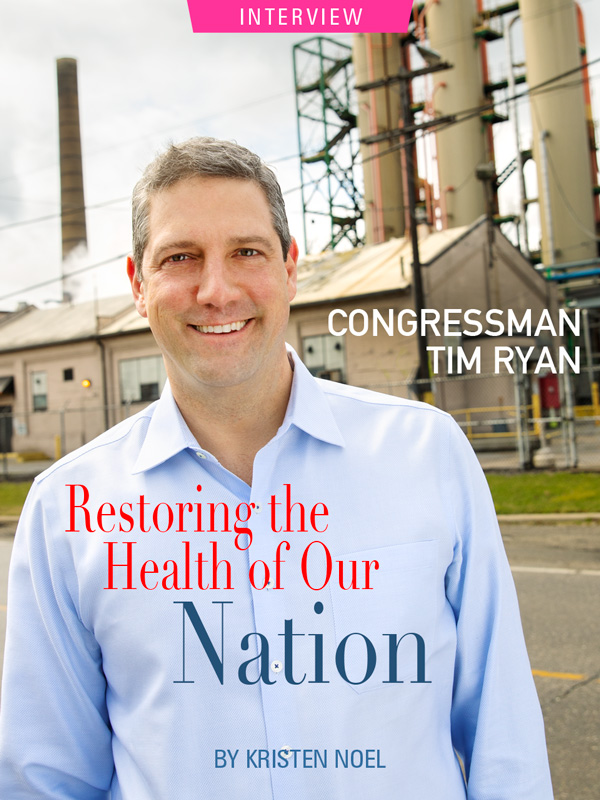
March 22, 2019, Youngstown, Ohio
At the end of the day, people just want an opportunity to have a good life, and I know that we can give it to them if we get our act together.”
~ Congressman Tim Ryan
Estimated reading time: 30 minutes
Congressman Tim Ryan, currently serving his 9thterm — was first elected in 2002 at 29 years of age. He is an enigma in a world of bi-partisan politics, but he also epitomizes what it means to be a Best Selfer.
Tim is a ‘big picture’ thinker who understands the very nature of connecting the dots of all aspects of our lives in order to best serve the whole. He is a man of the people — equally comfortable standing with farmers, CEO’s, and laborers. With a commitment to economic, environmental, and social wellbeing — he holds a bold vision for improving wellness, education, food systems, and technological innovation. He has a plan for creating unity and opportunity for all — most of all for healing the body politic.
As an advocate of mindfulness, he is as candid about his own daily practice as he is dedicated to sharing its merits to improve the quality and health in the lives of others — from veterans healing trauma and children improving their ability to learn, to helping fellow politicians become better leaders.
Congressman Ryan invigorates a fresh sense of hope in a climate of bitter divisiveness and contention while being uniquely poised to act as a much-needed bridge between conversations and communities. Tim is the author of The Real Food Revolution and most recently, Healing America. He is also a husband and father who has the chops (and the heart) to get the job done.
Kristen: Well, hello my friend. Thanks for sitting down with us and welcoming us back into your home state of Ohio.
Congressman: Thank you.
Kristen: I should probably point out that you are the first person to be on the cover of Best SelfMagazinetwo times.
Clearly, we’re fans. But it’s not just because you’re a good guy; it’s because you are bridging a conversation that needs to be bridged. Before we dive into all of that, Timothy John Ryan, is there something that you would like to share with your Best Self family?
Congressman: Yes! I’m running for President of the United States.
Kristen: Well, that is certainly a first — no one has ever said that to me in an interview!
Congressman: We’re super excited about it. We think that beneath the chaos and all the noise of the current political climate, there is nothing but opportunity — that the solutions for our nation are out there across the country, percolating up. I’ve been seeing that, and I’m excited about throwing gasoline on those fires and bringing that kind of life and spirit back to public debate.
Kristen: One of the many things that stuck with me a few years ago was when you said, “We have people who want to be one with the Universe that don’t want to be one with DC.”
We all have friends who don’t want to talk about politics, particularly in this incredibly contentious environment. But you also said that, “We need to bring our practice from the mat and into the world and to be a part of the conversation.” In other words, joining the conversation is not really an option.
Congressman: Yes. I ask people who are into contemplative practices, such as yoga, self-reflection, mindfulness, building community, “Don’t you think now more than ever that the country needs someone like you, someone with your beliefs, someone with your practice — to take it off the mat or off the cushion and bring that into the world? If you’re not going to do it now, when are you going to do it?”
We need people who can deescalate situations. We need people who can listen deeply. We need people who can recognize how not only are these really complicated institutions not working, but we’re not even seeing how they are interconnected to begin with.
I think people who take time every day to get centered and come from that quiet space see things as interconnected. We need that contribution right now if we’re going to fix the craziness.
Kristen: The reality is that many of us can’t even have these conversations with our own families — let alone with our co-workers and communities. But we’ve got to be in it, instead of just home complaining about it.
Congressman: Exactly.
Kristen: A divided country needs a bridge, not a wall. It feels like we’re at a moment of ‘dis-ease’ — an impasse with a real distinction between us against them, red versus blue. What does it mean to you to be a bridge?
Congressman: Getting out of the ‘either/or’ and getting into the ‘yes/and’ mindset. We’re asked by the leaders of the country, by the media, etc.: Do you fall into this camp or that one? Do you have on a blue jersey or do you have on a read jersey? We’re always asked these either/or questions and that causes tremendous anxiety. Life isn’t either/or, cut and dry.
Kristen: It just seems like there’s absolutely no room for conversation in the middle.
Congressman: There’s no conversation in the middle.
Kristen: You’re in the political trenches and you’re seeing how nothing is getting done. How do we jumpstart that? Shouldn’t ‘We the People’ be demanding more from those who represent us? Shouldn’t we insist that they do their job on behalf of all of us instead of isolating in these camps? Somebody’s got to start playing nice on the playground.
Congressman: I think it takes the leadership of the President of the United States to set the tone and to decide if we are going to be in these either/or camps or if we are going to break the gridlock and reassemble around some new priorities. If the President is inciting the rifts in society — cultural rifts, social rifts, economic rifts — then we’re going to keep having this separation. But if you have a President that refrains from either/or dynamics and instead reframes the question by asking how we can come together to solve problem X using the best of the free market and the best of the government — that’s how we can move forward.
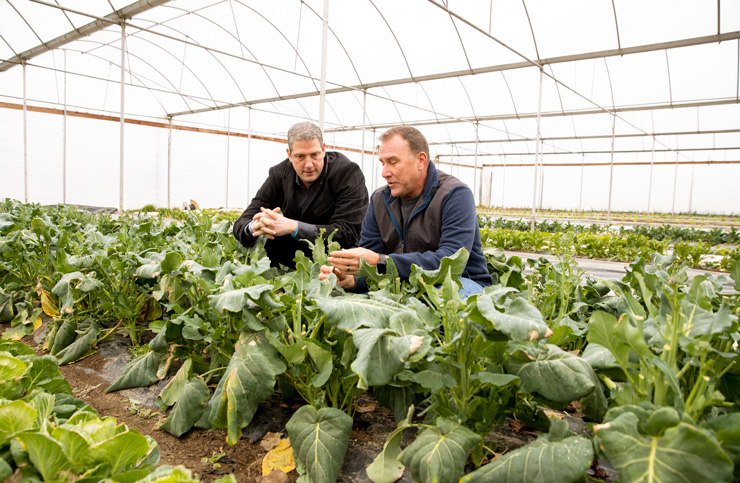
Kristen: As children we were taught in school that we are a nation of immigrants — a melting pot — and yet there seems to be a climate of pervasive intolerance, increasingly so. What do you think needs to be changed with regards to that?
Congressman: We’re a nation with a very complicated history. For all of our deep values that are embedded in our Constitution and Bill of Rights and our founding documents, we’ve come up short in many regards. I think part of it starts with a deep, honest conversation about race and about immigration.
My mom is 100% Italian; her grandparents were Italian immigrants. We grew up hearing the stories of how poorly the Italians were treated when they first got to this country. That’s a black mark that affected my family. But you hope we have evolved and can now recognize that those Italians that were once made fun of went on to assimilate and build productive, thriving lives.
At some point the light bulb goes off and we begin to say: Okay. We know it gets a little messy when a new group comes into a more established group. How do we do that with grace and dignity?
Kristen: …and humanity.
Congressman: And recognizing the humanity in these people, not shaming them.
Of course we’ve got to secure the border. But we also need to remember that diversity and immigration have been such a key component of making America great.
Just think about the DNA that lies in Americans because of the generation after generation of risktakers from all over the world who came here. As a result, our gene pool in the United States is made up of risktakers. Having that DNA feeds our economy. It feeds our innovation. It feeds our creativity. So, let’s recognize that and say, Okay. This is a good thing.
Kristen: You are rare in the sense that you don’t belong to an ideological faction. This is something that frustrates me about the party system in this country. If you belong to a party, it is assumed that you’re just going to vote one way or the other — regardless. What happens to the head, the heart, the conscience? How do we shift those things so we can allow our representatives to vote for what they believe is right as opposed to expected party affiliation?
Congressman: Again, the president of the United States has to set that tone. I think having some honest conversations with the country to say to the Conservatives, “Look, cutting taxes for the wealthiest people in the country does not solve all of our problems.” To say to the Liberal Democrats, “A new federal program or more government spending in and of itself does not solve all of our problems.”
How can we come together and use the best of the free enterprise system that innovates better than anything else and distributes capital when well-regulated markets exist? We need the best of both. Again, it’s not either/or — it’s both/and.
So the President has to say, Look, we’ve got to let go of these old ideologies. You look at the economy taking off. You look at technology taking off. Government’s hanging back, completely lapped by what’s happening in the real world. We’ve got to get the government up and running in an effective way. That’s going to take everybody saying, Okay, we need a little bit of both.
Kristen: Someone’s going to have to recognize that they are elected to have these kinds of conversations.
Congressman: And recognize that a fellow politician should not be your enemy.
Kristen: Besides, we’re allowed to disagree. It’s called a ‘conversation’. Right now, it’s my way or the highway.
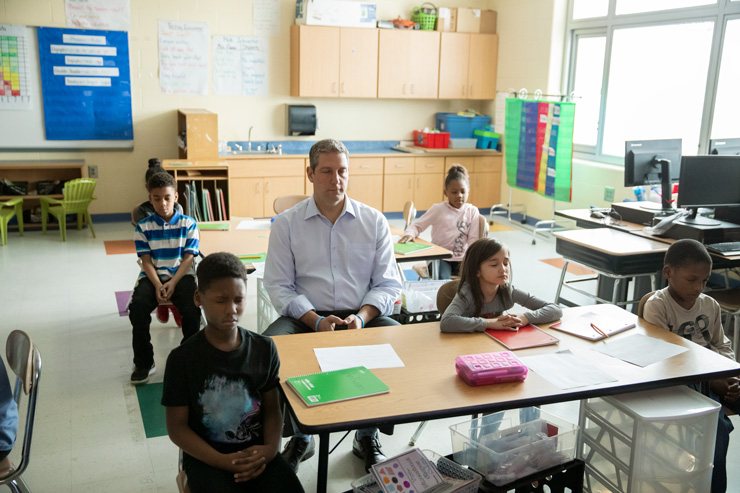
Congressman: Right. The other thing the President really needs to do is set the goal.
Let’s talk climate: We are going to increase the temperature of the planet by seven degrees Celsius over the next 70 years. We’re already seeing effects in our day-to-day lives in weather patterns. So we’ve got to reverse this. Let’s agree on that. Then, how do we accomplish that? We’re not going to do it without the free enterprise system.
It’s also going to take the government to put in research money, to set the goals, objectives, and boundaries around how we move ourselves away from fossil fuel while keeping the economy stable. There’s a way to do it if we can first agree on what the goals are.
Kristen: What does the American spirit mean to you?
Congressman: To me, spirit or spirituality is all about connection — it’s being connected to yourself, connected to a higher power, connected to each other, connected to the world around us, connected to the nature that sustains us. The American spirit is where we reconnect to that energy that comes from working well as a team. That’s when our country is at its best.
Kristen: You’re a Democrat, yet your constituency is primarily a red Republican state. Roughly 45,000 people in your district voted for you and for President Trump in 2016. To me, that demonstrates your ability to cross the divide and, in particular, to defend working-class Americans. You appear equally comfortable whether with farmers in a muddy field or rubbing elbows with influencers and CEOs on Wall Street.
How can you be a bridge and ensure voters that you will represent the whole as opposed to a slice of the pie?
Congressman: I see that everyone has a very important role. A lot of people talk about transforming the food system and yet they pooh-pooh the farmer. They talk about decarbonizing the economy and yet they pooh-pooh the business people.
I grew up in a family that had small business owners. Many of my friends today are Republican business people, yet I represent a very working-class district. The point is that it’s going to take all of us doing what we do, playing on the same team with a common goal: the good of the whole.
There’s a great story that my friend who represents Louisiana tells. He’s buddies with a celebrity chef. One night he was having dinner with the chef who asked, “You know who the most important person in my restaurant is?” And my friend asked, “Who?” The chef said, “The dishwasher.” My friend responded, “The dishwasher? Why would it be the dishwasher?” The chef replied, “Because the dishwasher sees who’s eating what throughout the night.” The dishwasher’s observations provide critical information for the chef.
The point being: We all matter. We all play a role, from the people who run the sewer system to the entrepreneur who takes a risk by mortgaging his/her house to start a business or puts their payroll on a credit card because they’re having a bad month and don’t want to let their workers down.
Kristen: I recently heard you say, “You can’t talk about healthcare if you’re not willing to talk about health.” Can you elaborate on this notion of interconnectedness — not just with healthcare, but with food systems, climate change, and the economy?
Congressman: In my mind, you can’t talk about healthcare without talking about health. You can’t talk about health without talking about food. And you can’t talk about food without talking about agriculture. Those are all very much interconnected.
Obviously, education is interconnected in there as well. Right now about half the country has either diabetes or pre-diabetes. Each diabetic patient costs 2.3 times more than a normal patient. If this trend continues, we will literally sink the healthcare system. So why are we spending all this time talking about Medicare for all, single payer, Obamacare, private care, VA care, fee for service, out of pocket?
We’re having this big discussion. And yes, of course we’ve got to have that. But the real discussion is — what can we do to make sure half the country doesn’t have diabetes or prediabetes?
Kristen: Hello!
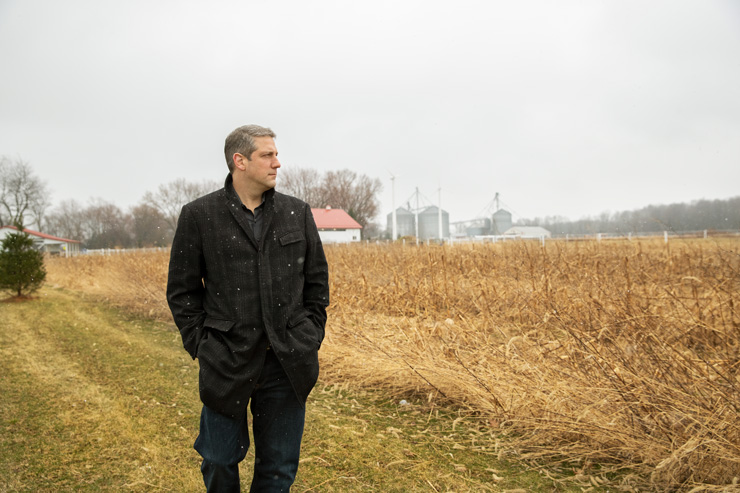
Congressman: How do we make sure millions of people don’t have Alzheimer’s? How do we make sure millions of people don’t have high blood pressure and heart disease? These things are going to collapse the system.
So here we are, the most powerful country in the world. We spend two and a half times more than every other industrialized country on healthcare — and we get the worst results.
You wonder why the American people are so upset at the government, at the insurance companies, at the pharmaceutical companies — they’re paying and they are not getting anything for it.
Kristen: Your book, The Real Food Revolution, truly demonstrates the interconnectedness of the food systems. It’s not just about pointing out the obvious problems — it’s about really coming up with tactical solutions, demonstrating true farm-to-table trickle down practices.
But it saddens me to think that there is still a huge part of this nation that isn’t making the connections between what’s on their plate and what’s happening in their lives. If they were, there would be more action, more outrage. We still have tremendous work to do in that arena.
Congressman: A big part of it is teaching our kids and getting this into our schools. We have to make the next generation aware of it. And we need to train our doctors. I have a bill in Congress to make sure doctors are actually getting the training that they need with respect to nutrition.
Kristen: More than the six weeks they currently receive, right?
Congressman: Exactly. They’re still not meeting the basic standard that has been recommended for them. Your doctor is really your healthcare professional — someone who is supposed to keep you healthy, not just deal with you when you’re sick — someone to talk to you about your diet, about your stress and the bigger picture.
Kristen: …good old-fashioned doctoring.
Congressman: Yes. When I went to Cuba I found it interesting how they handle their healthcare. The doctor typically lives in the neighborhood and is always available as a part of the community.
Kristen: And clearly, they have a better understanding of what is going on in a patient’s life and what factors are impacting their health.
Congressman: Not recognizing that there is a connection between what’s happening in our mind with what’s happening to us physically is putting Western medicine behind the eight ball. Doctors in our system don’t have time to sit and ask what’s going on. They only have time to write prescriptions.
Kristen: It’s not even their fault. It’s the current state of affairs in our healthcare system.
Congressman: Right. So how do we best restructure that system? Our system has basically become a disease management system. And the reality is that we’ve made disease very profitable.
So here come the pharmaceutical companies and the insurance companies who just wait until you get really sick, and then see how much money they can all make. Instead, the incentive should be: How do we keep people healthy?
How do we reward companies who are moving in the health wellness space? How do we make sure that they’re profitable so that they can continue to help us prevent these diseases? We could save so much money if we adopted this approach.
Kristen: And how do we reward people who are healthy?
Congressman: It should all be built into the equation.

Kristen: The tides have changed in Congress with a season of firsts for women and people of color. What has your experience been with this? And how do you plan on fostering that?
Congressman: I think it’s been terrific. The influx of energy from the freshman class — dynamic women of all religions and backgrounds — has brought a lot of insight and I think they’re setting examples for little girls all over the United States of what’s possible. That will only amplify what this country needs to do. We need everybody in the game to help solve these problems.
Kristen: We’re led to believe that there is this perceived separation of church and state. And yet it feels like the dogma and doctrine of some is being imposed on others. I’d like to know what you would say about protecting those rights, keeping them separate while still protecting the rights for women, LGBTQ, gay marriage, etc. How do we keep that separation intact?
Congressman: I see this simply. You’re two things: You’re a child of God and you are an American citizen. As an American citizen you are protected with certain rights that you can have your own beliefs and you can belong to a certain house of God. But those beliefs cannot penetrate the protections that other Americans have. That’s the beauty about being an American citizen. And so the government can’t be pushing religious policies that violate those human rights, those rights that you have as an American citizen.
I think reestablishing that belief is going to be critically important, especially now where the religious beliefs of some can be used to diminish the inherent rights of others — whether it’s LGBTQ or a woman’s right to choose, for example. Those rights should not be violated by religious doctrine making its way into American legislative doctrine.
That’s what we see in communities and countries in the Middle East with Sharia law, where the church and state are one and rights are severely diminished. In doing so here in this country, we are basically going backwards from the American Revolution and all the great documents that emerged from that.
Kristen: In this environment, It feels like we take two steps forward, three steps backwards.
Congressman: Yes, and you’re primarily seeing it in the states. Ohio, for example, has some of the worst, most intrusive laws around abortion and diminishing women’s rights. So even at the national level, where we may be maintaining the status quo and hopefully moving forward, in some states, it’s brutal and it’s going backwards.
Kristen: Let’s talk about changing positions. In 2015, you changed your position on abortion and in 2012, after the horrendous Sandy Hook Elementary School shootings, you changed your position with the NRA (National Rifle Association).
Given that you’ve taken both progressive and conservative positions, some could accuse you of shifting views to match political tides. What do you say to those who criticize you for vacillating? Is it vacillating or is it having the willingness to see things differently?
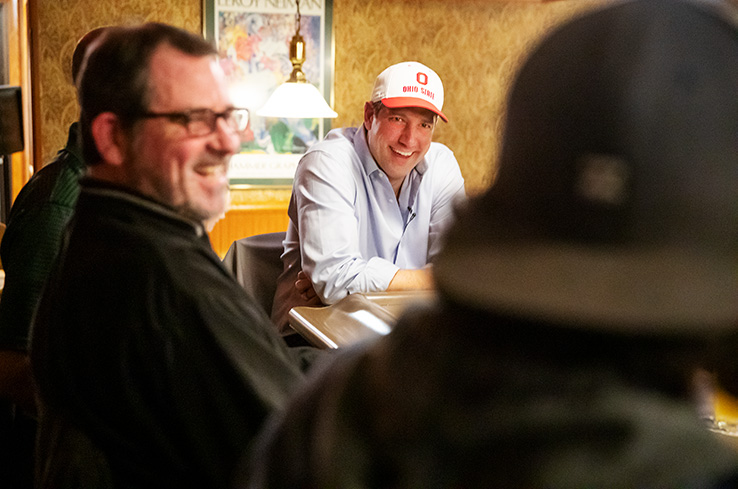
Congressman: I think we all should make decisions based on our experience. The older you get the more experience starts to accumulate. If you continue to keep an open mind, those experiences may influence and shift your beliefs. On those particular issues, they did.
How many school shootings can you witness without saying: Wait a minute. We have to do something here? I hunt with my son. It’s something that we love to do. That has nothing to do with making sure that a criminal or a terrorist, or someone who has a mental health issue, can go out and get a gun — let alone a gun that is built to kill lots of people in a very quick period of time.
That’s just ridiculous. I can’t support the NRA. They don’t even want to come to the table and have a conversation. So, all the money I ever got from them I gave back to Gabby Giffords’ group and the other gun control groups to send a signal: Look. If you’re not even willing to have a conversation, I’m out.
The same happened with regard to abortion. Over the course of my career, I started softening my position because I kept meeting women who were dealing with these very difficult and complicated circumstances. I learned from them and changed my view because of these interactions. The more stories I heard, the more I recognized that a bunch of dudes in Washington, DC should not be in a room with a woman, her partner, and her doctor when it comes time to make these kinds of decisions.
It’s a legal right to not allow legislators to come into that woman’s private space and tell them what to do.
Kristen: At the end of the day, money talks. I know that economic well-being is at the core of your platform. I want to know how you are going to assure those living paycheck-to-paycheck that they’re not going to be left behind.
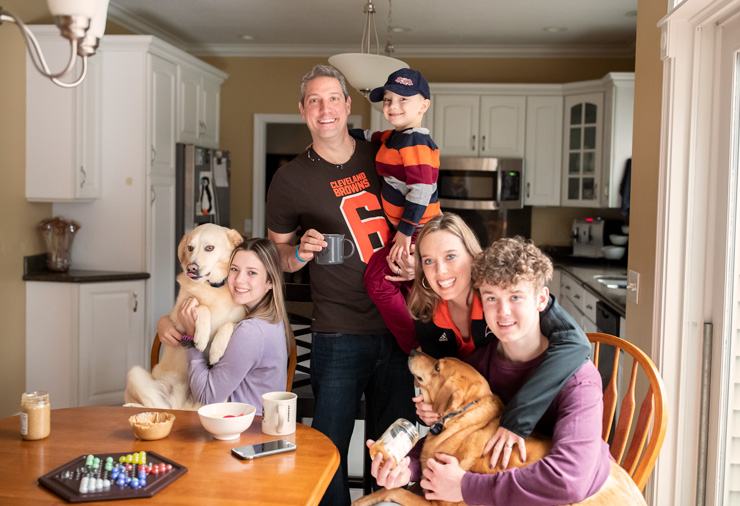
Congressman: We have got to get the economy working in a way that allows those people who want to work hard and play by the rules to have economic security, healthcare security, and retirement security.
And if that’s not working, then the economy’s not working. We are so far beyond the old metrics and the old ways we used to measure things. The unemployment rate is as low as it’s ever been. The stock market’s as high as it’s ever been. Yet almost 50% of Americans cannot withstand a $500 emergency. They have very little in savings for the future, for themselves, and for their retirement. We still have people losing pensions. We still have people that can’t keep their nose above water economically because they are worried about getting healthcare and all the rest. This is ridiculous in this country.
So it’s about focusing on an economy that’s growing — and again, it’s not either/or. You need businesses to be creating jobs that pay a good wage in places like Youngstown, Ohio. What are those industries and how do we all move in the same direction with electric vehicles? For example, how are we going to go from producing two million electric vehicles to 30 million in the next 10 years? Who’s going to make those?
We need to make those in the United States. We need to have the workers involved, and then cut them in on the deal so that they have that economic security that they need. These industries are growing at 25-30%. America Makes in Youngstown, where we are sitting now for this interview, is being built around additive manufacturing and 3D printing.
There are going to be 3-5 million jobs created in additive manufacturing in the next 5-10 years. How do we as a country say, “We’re going to dominate this industry and we’re going to take care of our workers, make sure they’re trained, make sure that we have 3D printers in schools, etc.? There are ways to do this — it’s not brain surgery. It’s just saying, “This has got to get done.” This has been going on for too long and these poor families have been left out in the cold.
Kristen: InThe Real Food Revolution, you shed some light on the power of lobbyists. While you were referring to the food systems, it is relevant to myriad issues. You said, “One of the reasons it’s so hard to change policies is the power of lobbyists in DC on behalf of corporate interests. For a member of Congress, being lobbied is a daily activity.”
I’m sure you’re well-versed in this, so how are we going to cut that lane between Wall Street and DC?
Congressman: I think we need to move to having publicly financed elections. We should do what they do in Europe and shrink the election season to about two months.
In Europe, you have a national conversation for two months where everyone’s talking about it. As opposed to here where the conversation goes on daily for two to four years. We also need to make sure that everybody has enough money to communicate their message — and disclose everything and make sure it’s transparent so everybody knows where the money’s coming from. Elect your leaders and then let them fill their term and do their job instead of spending all this time trying to raise money.
But the real problem today is the incumbents. The people who are currently sitting in office don’t want that because the incumbents have the advantage of raising money because they’re the incumbents. They hold the power, and so they are able to raise that money. So they certainly don’t want to mess up that system.
But we’ve got to transform this system because whether you look at food or the pharmaceutical industry or the energy sector, go right down the line, some people have undue influence. The power structure has been so tilted towards the 1% of the people who have all the money, that it’s now poisoned the political process.
Kristen: Tell us what actually happens to a Congressman — what lobbyists do on behalf of corporate interest.

Congressman: The issue is the money. What you see from the bigger corporations is that they raise a lot of money. Their executives raise a lot of money. They put money in the super PAC’s (independent political action committee) which can accept unlimited amounts of money. No one really needs to know where it’s coming from. It’s what is referred to as ‘dark money’.
Essentially, any industry can currently put money into a super PAC and run ads against a particular candidate who is going to take on that industry. That’s how it becomes undue influence.
But we’re in a democracy where people matter. You’re seeing a real shift to low dollar donors today that can fuel a candidate. You get a million people to give you 10 bucks, you have $10 million.
Kristen: In a sense it’s a return to a more refreshing grassroots approach.
Congressman: … and democratization, which I think is really important. That’s why I’m saying, why don’t we just ban all this other stuff? Get the cancer out of the system. Get the body politic healthy.
Kristen: Amen. Reaching across party lines, socioeconomic, gender, and racial divides — what do you want to say to young voters? And how can we reach them and ensure them that they will be heard, that they will be represented — and ultimately get them to the polls?
Congressman: I would say a couple things. One: We can do this. America has done this before. We can do it again. But it’s going to require them to engage in the system as well. We want to invest in them. We want to make sure they don’t have college debt. We want to make sure that they have opportunity.
But the other part is that we also need to challenge them. They need to be the innovators and the entrepreneurs. They’ve got to help us invent new systems and technologies. They have to get into our schools as
teachers and principals and superintendents and innovate our education system — focus more on social and emotional learning. If they become doctors or nurses — how are they going to transform the healthcare system? If they’re going to go out and be farmers — how are they going to transform the agricultural system? They have to do this.
I’m 45 years old. I’m going to help. My goal in this campaign is to give young people a big vision and point them in the direction they need to go with the tools to help them get there. But ultimately, they’ve got to step up and make it happen.
President Kennedy said, “We’re going to the moon,” and then provided the resources for getting there. But at the end of the day, it was a bunch of really smart engineers that worked for both NASA and in the private sector that got us there.
So our job is to set the challenge, create the vision, provide the resources and some inspiration. But ultimately, it’s the American people that have to get it done. And if this generation doesn’t get it done, we may be so far behind the eight ball that it’s going to be tough to catch back up.
Kristen: Clearly, throwing your hat into the ring is not just a decision that affects you. I was wondering what that conversation was like when you and your wife, Andrea, sat down and you actually said, “Okay, we’re going for this.” What was the conversation like with your kids? What was going on inside you that fundamentally said, “I’ve got to do this”?
Congressman: At one point, Bella, our 15-year-old daughter, said to me, “You have got to do this.” I said, “Why, Bella?” And she said, “Do you see what he’s doing to our country?”
In Ohio, we live with the job loss. When General Motors closed, we knew the people who worked there. Bella called me one day from school, crying because of this girl whose dad got transferred when they closed the plant. Bella pleaded with me to do something.
Kristen: It doesn’t get more real than that, right?
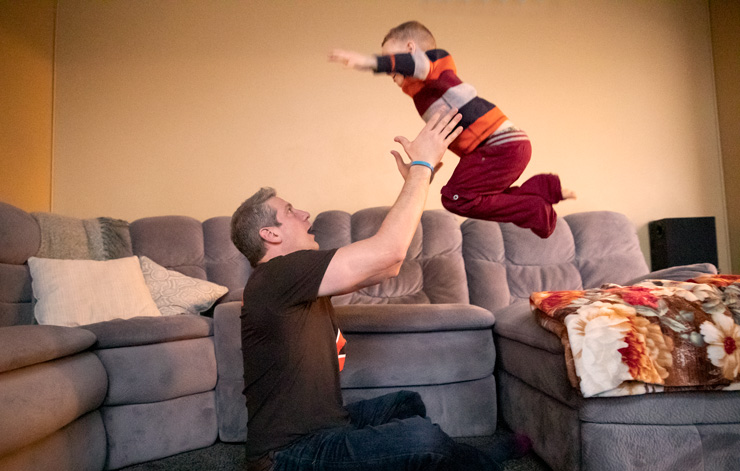
Congressman: That’s real stuff that my family goes through. We live through this in our community. They know that I understand deeply what people are going through and what we’ve got to do to fix it. So they’re all onboard with going down this Presidential campaign road.
We’re trying to find ways to incorporate them into the campaign. My wife’s dad lost his job 40 years ago when a mill closed. That kind of event leads to a cascading effect of decline in local economies. I feel passionate about getting in this race and delivering a message on behalf of all of those people who’ve been watching this decades-long train wreck.
Maybe it’s time for somebody from a community like mine to actually be in the most powerful position in the country in order to say, “This is unacceptable and this isn’t going to happen again.”
Kristen: What makes you the right candidate?
Congressman: I believe that I have a very unique experience compared to everybody else in the field, who are all great people. I’ve lived in this area in northeast Ohio for 45 years. I’ve watched communities like ours get disconnected from the global economy, disconnected from growth, disconnected from new waves of technology. I have witnessed the federal government not really care. I’ve spent my entire career trying to reassemble a new economy here locally.
So I understand what communities are going through. I understand what families are going through because when we lose factory jobs here, it’s my family members and friends who are impacted. When businesses close, I know who they are. But I also know what the future needs are.
I know because I’ve been studying it to help my area. What I’ve come to realize over the last 17 years in Congress is that if all of these communities who have suffered don’t come together and set a national agenda — then these communities are going to continue to struggle. We’re going to be able to move forward slowly, but we’re not going to have the kind of transformational change that we truly need.
Kristen: You see the big picture and support the whole picture — not just a slice of that pie. We want to support the working class, but we also want a thriving economy and a thriving Wall Street. We want a government that’s speaking to each other. I want to make sure that people don’t peg you as just supporting one sector of our economy.
Congressman: Well, as you said, they are interconnected. We’ve got to be functioning on all cylinders and fueled by a challenge. We had that in the ’60s, with our space race to beat the Russians to the moon. We had our great ‘Sputnik moment’. If you look at the current political, economic and cultural landscape today — we need about a dozen Sputnik moments all at the same time: on climate change, healthcare, wages, job security, energy, on our foreign policy, opiates, etc.
We’ve got all of these challenges that we have to address concurrently. We don’t have the luxury to put them on a list at this point and prioritize them. But the only way that we’re going to be able to meet these challenges is if we come together. They’re just too big. So you can’t do it without the private sector, or the government or black people, or gay people or an influx of immigrants who are bringing new ideas…No, we can’t isolate into our separate camps and expect to resolve these issues.
Kristen: If you could wave a magic wand across this nation right now, what would your vision of America 2.0 look like?
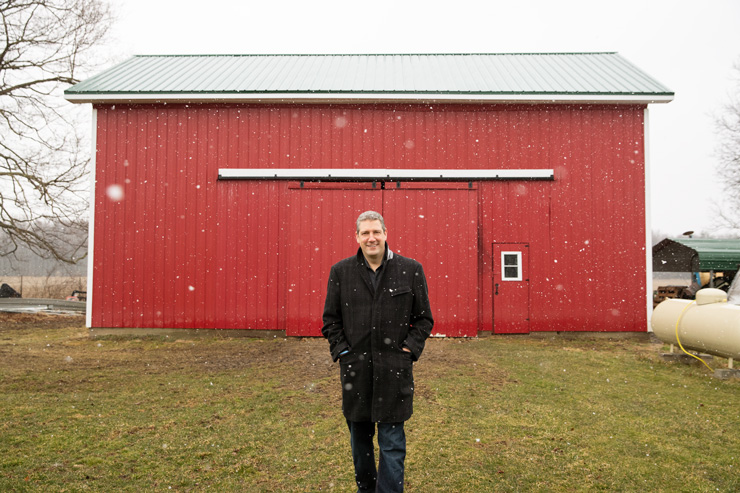
Congressman: Our cities would be clean and fresh and new. We would take down the dilapidated homes that mark many neighborhoods across the United States. We would have a new infrastructure. We would be an economy contributing to the reversal of climate change that had the cutting-edge technologies to be able to decarbonize and provide renewable, efficient, clean energy.
We would have schools that focused on caring about our kids first and foremost, dealing with their trauma and then providing them with opportunities to thrive through sports, through art, through music, through dance.
There would be communities where you can work and enjoy a high quality of life. We’d just take the tempo down a little bit. I think everybody’s a little fed up with the pace, the speed, the lack of connection, the lack of time together, the lack of ‘quality of life’.
We’d create an environment where we’re a mindful nation, where we have time to connect with each other. At the end of the day, people just want an opportunity to have a good life, and I know that we can give it to them if we get our act together.
Kristen: All right. Here’s the magic wand. I like that vision.
You are a bright light in the body politic. I applaud you, my friend, for getting up off your mat and throwing your hat into the ring — for walking the walk and talking the healing talk — and for holding a bold and restorative vision for this nation. And for understanding and honoring the interconnectedness of it all — and for truly celebrating this notion that united we stand and divided we fall.
Aside from ‘good luck’, I thought maybe in a couple years we could do this again this in the Oval Office?
Congressman: Done! That’s an absolute done deal. That would be great.
